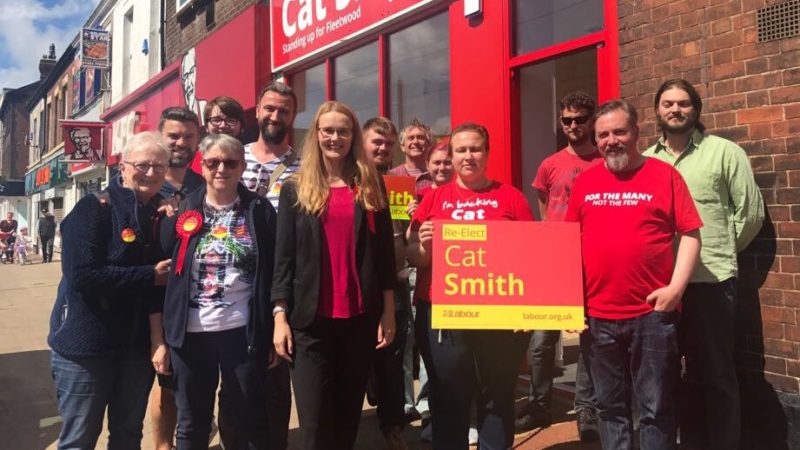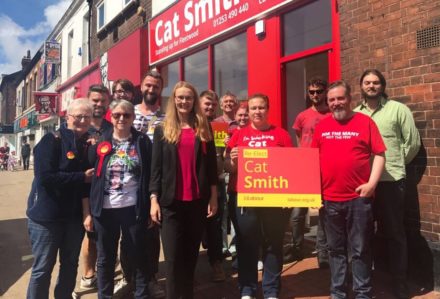

Cat Smith has probably the hardest task of any of the early backers of Jeremy Corbyn’s leadership as she aims to hang on to her marginal seat of Lancaster and Fleetwood.
Smith had a majority of 1,265 in 2015 and, with just two years to increase her name recognition, she has a real fight to hang on to the Brexit backing constituency. The previous Tory MP, Eric Ollerenshaw, is standing again, and there is no UKIP candidate this time around – so the regressive alliance rears its head once again.
What have you got to offer the people of Lancaster and Fleetwood?
“I’m re-standing as a member of parliament for Lancaster and Fleetwood, after only being elected for the first time two years ago! I’m hoping for another five years to finish the job that I started.”
“In Fleetwood one of the major issues we had – a lot of elderly people live here – was with NoWcards [concessionary travel passes] had been previously been allowed on the trams, and then they weren’t because of changes at the council.
“I was part of the campaign to reinstate the cards on the trams, and we were successful – now our pensioners can travel on the trams as well as the buses. We have fewer bus routes here because we have trams. For anyone who is unaware, Fleetwood is just to the north of Blackpool, so it’s the Blackpool trams that run up and down the Fylde coast. We’re on that tram network. That’s something that’s reflected across the entire constituency: the way that council cuts have meant we’ve lost services.
“A lot of my constituency is quite rural, and when you lose services in a rural area it’s felt much harder. When you’re in a big city, and some of your libraries close, you’re probably still in reasonable distance of another library. In rural areas, you can be two or three bus routes away from another library.”
“Austerity is hitting the north and rural areas particularly hard, so I’m campaigning against that.”
“I think Lancaster and Fleetwood was a microcosm of the country. So, when we’re coming out of the EU: what’s the future with regards rural payments? Where there’s previously been EU subsidy, is there going to be support from the government? We’ve got no clear answers. When it comes to higher education, because we’ve got two universities in the constituency as well, what is happening there with regards our membership of Horizon 2020 [research scheme] or Erasmus [student exchange programme]?”
“Also, my constituency was very badly flooded by Storm Desmond in 2015, and we’ve still not got any flood defences along the river Lune which runs through Lancaster, so that’s been part of my campaign as well.”
“There are all of these issues going on, and I don’t want to go back to having the Conservative MP here previously who didn’t even have an office in the constituency.”
“I live in the constituency, the Conservative candidate lives in London, and I think it’s important to have that local voice being heard in Westminster politics.”
How would you describe your politics?
“Labour. I’m probably quite tribally Labour – I do believe it’s only ever a Labour government that will bring about social change that benefits the vast majority of people in this country. The Conservatives are only standing up for the one per cent – it’s a very elite-elite that the Conservatives are benefitting. My grandfather ran his own business, and my husband runs two businesses, but small business does not benefit from a Conservative government.”
“They cannot thrive under a Conservative government that is changing the business rates and pricing out pubs, shops and restaurants off our high streets with their business rates changes.”
How has Brexit affected the seat?
“This is possibly the most toxic general election that I have ever taken part in, I realise being 31 that’s not that many. It’s my fourth general election and the country feels very divided, but actually I don’t think it’s anything new. I think that sense of division has been there under the surface for a long time. We’ve found it very difficult to articulate it.
“My constituency probably sums it up quite nicely, you’ve got Lancaster which voted heavily to remain in the EU as a city [but] as a district it was slightly different because it’s quite rural.
“Fleetwood voted very heavily to leave. And I think that reflects some of the problems we face as a country right now. We have very different ideas of what the future looks like. Everyone’s voice must be heard, and in some ways we all need to get out of our comfort zones and understand why people who hold different views to us hold them, and what it is that people’s hopes and fears are for the future.
“It’s about finding that common ground that can bring the country together, and actually the Labour party is in a really strong position to do this, because we have MPs that represent seats that were really heavily leave and really heavily remain. In a way the Conservatives haven’t got that diversity. We need to use that, to our strength. We know these people, these are people we represent. Let’s put our heads together and find a way to bring the country together – because we need to bring the country together.”
What has been the biggest local issue?
“Not Brexit. I thought, before the general election got going, I assumed that the election would be very heavily on Brexit, and it’s not. It’s different issues in different parts of the constituency, people are still talking to me about the local hospital, or what the council has done – all of our councils have had to make cuts.
“Quite a lot of issues are coming up, and I think that will reflect the diversity of issues that will come up across the country.
“In Fleetwood people do want to know what the future of fishing is going to look like outside the EU, that doesn’t come up in Lancaster, there you’ll get people wanting to know about research funding for academia. That doesn’t come up in Fleetwood. And in our rural areas it’s cuts to bus services, it’s the threat to our ferry link which links my constituency together – Fleetwood and Lancaster are not contiguous by land, it is a foot ferry that links us. The funding for that was unsure going forward, because it was subsidised by the county council who’ve had 60 per cent of their budget cut.”
Labour faces mixed poll ratings nationally so how do you deal with that locally?
“The polls are disappointing, and they need to get better, but to be honest I’ve not really thought much about it, I am just speaking to voters in Lancaster and Fleetwood. I’m standing on my record, that in two years I’ve achieved far more than the previous Conservative MP had achieved in five.”
“The national polling I don’t tend to think about it too much, if I’m honest. I think national polling is increasingly quite difficult to apply on a seat by seat basis – I don’t think we’ll see a uniform swing in this election in the same way as you have in previous elections.”
Do you think Labour receives a fair hearing from the media?
“It depends what you mean by the media. If we talk about newspapers, all newspapers have their political bias. The vast majority of newspapers do have a bias towards the Conservatives, but then there are some like The Mirror that have a bias towards Labour – I assume there are some Conservatives out there who don’t feel like they get a fair crack from The Mirror! As it happens there are more Conservative-leaning papers, so the print media overall picture’s not great.
“But increasingly people aren’t reading newspapers, they’re getting their news from different sources, they are getting their news online, on social media – though of course that has its threats with it through fake news. It’s increasingly obvious to me, speaking to voters that a lot of people are deeply misinformed and have fallen for fake news but they won’t believe a politician when you explain to them that Barack Obama isn’t actually a Muslim, for instance. If they’re convinced of that, they’re convinced of it.
“That’s one of the biggest challenges we have as a country, because increasingly the political debate isn’t well informed, people aren’t making informed decisions, and that is not good for the future. Thats something there needs to be political consensus on, how do we stamp out fake news?”
When was the last time you had to relax and how did you spend it?
“I’ve not had a day off since Easter Sunday, I spent it with my family we had a big dinner. Easter Sunday is really important in my family because my sisters both work for supermarkets, and its the only day off that we can guarantee as sisters that we can all spend with our parents. It was sisters, partners, dogs, babies, all round at my mum and dads. My dad cooked and we had a roast dinner.
“And ever since then I’ve been campaigning every single day.”
Want to help keep Lancaster and Fleetwood Labour? Click here for campaign events near you




More from LabourList
Turning the page? Labour’s recovery in the polls show a path to 2029 victory
Restoration announce recommendations for NEC candidates
‘Factionalism at the top is weakening Labour – and handing a gift to Reform’